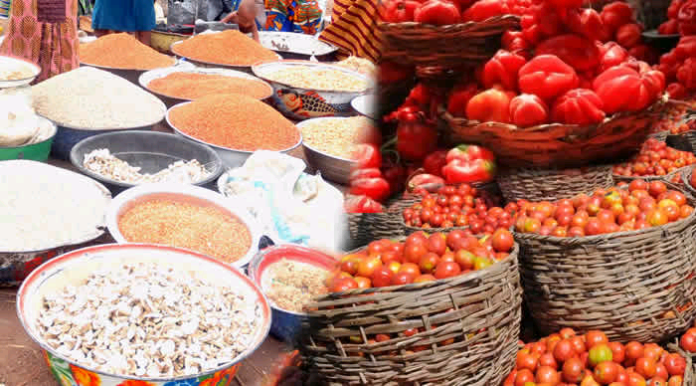Across-section of experts and farmers in the South-East have attributed the continuous hike in prices of foodstuffs and farm production to insecurity and multiple taxes.
The groups disclosed this to journalists while reacting to the causes of soaring prices of foodstuffs.
Azubuike Idam, an economist in Abakaliki, Ebonyi’s capital, described the developments as “multifarious” and blamed the problem on the devaluation of the naira, the lack of political will on the part of the government, poor roads, and an inadequate power supply.
READ ALSO: Tinubu, Atiku, Obi Are Not Interested In Fight Against Poverty – Adebayo
The expert recommended that the federal government stabilise the naira rate, increase agriculture production, give facilities to farmers, and provide adequate security to farmers and the entire country.
Albert Eleri, a security expert, advocated for an advanced security system and approach to tackle kidnapping and communal, farmer, and herder clashes in the country.
Mr Eleri said the advanced measures and actions if implemented, would tackle insecurity, allow farmers to return to farming comfortably, and boost productivity.
Linus Ogodo, a farmer, urged the federal government to be proactive and sensitive to its citizens’ plights.
Mr Ogodo called for the availability of fertilisers to farmers, grain, the provision of farm settlements, and irrigation facilities, especially during the farming period, to boost food production.
Another farmer, who gave his name as Ogbonnaya, suggested that governments should revive silos for proper preservation and storage of grains.
Mr Ogbonnaya also encouraged the government to follow up on agricultural intervention programmes in the country to ensure they were carried out for the intended purpose.
Sylvia Nwafor, an Abakaliki resident, described the continuous rise in prices of food items as “frustrating and embarrassing” to citizens.
A custard bucket of beans is sold between N9,000 and N10,500, against N2,800 and N3000 sold in January. Also, a yam tuber is sold between N2,000 and N13,000, depending on the size.
A plastic bucket of rice is sold for between N8,000 and N9,000, up from N3,000 in January, while a 25kg bag of local rice, depending on the brand, is sold for N35,000 and N37,000.
Some food dealers at Ose Okwodu market in Onitsha North, Anambra State, said they were not to blame for the regular hike in food prices.
The traders discussed factors contributing to the regular hike in food prices during an interactive session with the Federal Competition and Consumer Protection Commission (FCCPC).
They identified insecurity, high transportation costs due to fuel subsidy removal, climate change, and inadequate attention to agriculture as major factors skyrocketing the prices of food items in the country.
Cyprian Onyejekwe, secretary of the Ose Okwodu Traders’ Union, said farmers who were the primary producers of food supplies were scared to go to their farms due to insecurity.
“Even the traders who go to buy from the farms are usually attacked on the road and even pay over N1 million to settle touts along the way. This is really affecting farming and the food supply.
“Usually, we spend about N1 million to transport goods from farms to markets, but now we spend more than N10 million to N15 million,” he said.
Also speaking, Emmanuel Ndubuisi, chairman of Grain Seed Dealers, said that droughts due to climate change destroyed and decreased farming output, especially grains, in 2023.
Mr Ndubuisi said Niger and Borno states, which were major producers of grains, could not produce enough to feed the nation.
“After the planting season last year, at the growth rate, drought damaged the 500 ps, which resulted in a low harvest.
“A 100 kg of beans rose from N100,000 to N220,000 and N260,000, a bag of maise rose from N45,000 to N120,000, groundnut rose from N90,000 to N189,000, and a bag of bambara nut now sells for N240,000,” he said.
Other dealers in tomatoes, peppers, onions, fish, potatoes, yams, and other food items urged the federal government to invest in and increase budgetary allocations to the agricultural sector.
A rice farmer at Ayamelum Local Government Area, Nicholas Ojimba, attributed the increase in food prices to insecurity across the country and seasonal variations.
“Also, the seasonality of some food items makes their prices fluctuate. Farmers return to the farm during the rainy season, and we usually experience a price hike during this period,” he added.
Gabriel Orie, chairman of the Ogbunka Farmers Cooperative, urged the federal government to establish ranches as open grazing is destroying farms, causing food insecurity, and destroying the economy.
“We urged Nigerians to consider ranching as a viable option at this critical time where food scarcity is causing a hike in the price of food,“ he said.
A professor of agricultural extension, Hyacinth Nwalieji, urged the government at all levels and stakeholders to tackle the challenges of climate change and flooding to ensure sustainable agricultural produce and food supply.
Mr Nwalieji called for the adoption of modernised or climate-smart agriculture in the face of climate change.
Meanwhile, the Enugu State government says it has taken proactive measures to tackle the high cost of food and insecurity in the state to boost food sufficiency.
The director of the Enugu State Agricultural Development Programme (ENADEP), Ogbonna Onyeishi, said farmers must increase production to reduce scarcity and high food costs and ensure enough produce in the coming years.
The chairman of the All Farmers Association of Nigeria ( AFAN), Romanus Eze, expressed the hope that cassava production in the state would boom.
He said the state government had begun the massive cassava cultivation in the last quarter of 2023.
The Commissioner for Agriculture and Agroindustrialisation, Patrick Ubru, said the state government had partnered with the Nigeria Security and Civil Defence Corps (NSCDC) to establish an Agro-Rangers Squad.
“This squad, with specialised training on agricultural protection and other technological gadgets, will checkmate all forms of insecurity complained about by our farmers, both commercial and smallholder farmers in the state,” he said.
(NAN)

























